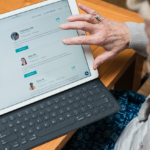The most common cancers in the elderly are: Breast Cancer, Prostate Cancer, Lung Cancer, and Bowel Cancer. Find out how to avoid and recognise them.
Common cancers in the elderly
Cancer is a concern for people of all ages, but the disease is especially prevalent in the elderly. It’s natural to feel frightened about your loved one developing a serious condition but by knowing the risks and the warning signs you can help them to protect their health and wellbeing.
Between 2013 and 2015 more than a third of new cases of cancer were found in women and men aged 75 and over. Incidence rates start to rise from the mid-fifties and reach a peak in the late eighties.
The statistics can seem scary but when it comes to health, knowledge is power. If you’re aware of the dangers you can help to modify the risk factors, be cognisant of the symptoms and act quickly if there are any worrying signs.
Cancers affecting elderly women
Breast cancer is the most common cancer in British women over 75 years of age. It makes up more than a fifth of all cancers in this age group, followed by lung cancer which affects 15% and bowel cancer which is diagnosed in 14% of women.
Cancers affecting elderly men
In men, prostate cancer is the one that is most commonly found. It accounts for a quarter of cancer cases. As in women, it is followed by lung cancer, which affects 16% of elderly men and colorectal cancer which strikes 14%. Altogether, these cancers affect half of all men diagnosed with the disease.
Breast Cancer
Breast cancer is usually picked up when a woman notices changes in the feel or appearance of her breasts. There may be a lump in the breast or armpit, the breasts may seem wonky, there may be nipple changes like a discharge or a newly inverted nipple, or there can be a rash or a dimpled appearance to the skin of the breast.
The good news is that lots of lumps are not cancer and by getting prompt medical treatment, the chances of a cure are much higher.
If your loved on is receiving care, and is being helped with personal hygiene, it’s vital that their carer stays alert to these signs. This is one of the reasons why receiving consistent care from one or two Carers is important. A regular Carer will notice any changes over time, and will be able to alert you to the symptoms.
Who gets breast cancer?
Breast cancer is the most common cancer in this country, and anyone can get it. However, it can run in some families. Between 5% and 10% of cases are genetic, or hereditary, and often affect younger women before menopause. Lots of exposure to female hormones, like oestrogen, can also increase the risk, so pregnancy and breastfeeding can be protective.
Protecting yourself
See your GP if you’re worried about your family history. Also, remember that drinking alcohol increases the danger of developing breast cancer, as does obesity and smoking, so try and control your lifestyle to protect your health.
Prostate Cancer
Prostate cancer is more than 20 times more common in elderly men compared to younger adults. The prostate is a gland found at the base of the penis, it’s usually around the size of a walnut and when it gets bigger it can affect the flow of urine.
Men with prostate cancer often notice:
- Problems going to the loo – struggling to get the flow started, and the flow being weak and interrupted
- Dribbling after they’ve finished in the bathroom
- Their bladder not emptying properly
- More frequent trips to the bathroom
It’s vital not to ignore these symptoms, but they don’t always indicate bad news. Many men’s prostates naturally enlarge as they get older. However, it’s always important for your loved one to see their doctor. An examination and a blood-test to check for Prostate Specific Antigen (PSA) can offer more information.
Who gets prostate cancer?
We don’t fully understand the causes of prostate cancer; we just know that it is rarely seen in people before the age of 50. However, some people are more at risk and should keep a close eye out for symptoms. Men of Caribbean or African ethnicity, and men with a father or brother affected by the disease, appear to be more vulnerable.
Protecting your loved one
There is some evidence that living an active life, eating a healthy balanced diet and avoiding foods that are highly processed, high in fat, or high in carbs can decrease the risk of developing prostate cancer.
What to eat:
- Vegetables, including: broccoli, cauliflower, kale, cabbage, carrots, peppers, jalapenos, tomatoes (lots of tomatoes, it’s suggested that they have a protective effect).
- Fruit, including: pomegranate/pomegranate juice, grapes, grapefruit, citrus fruits, avocados, apples, berries.
- Whole grains, including: brown rice, oatmeal, corn, whole wheat bread, barley, bulgar.
What to avoid:
- Animal proteins, including red meats like: beef, lamb, and pork, and also dairy products and general animal fats.
- Processed foods, like: white bread, pre-packaged foods, and freezer food like chicken nuggets and chips.
- Sugary drinks.
- Where possible, choose organic produce over non-organic, as non-organic pesticides have been linked to various cancers.
This may seem like too much. After all, elderly people get set in their ways. Less was known about diet and disease earlier, and a lot of elderly people think that these measures are “a lot of fuss over nothing.” However, experts now believe that choices in diet account for the vast majority of prostate cancer cases, so it’s worth making the fuss.
It may be easier than you think. Perhaps limit red meat to once a week and general meat intake to three times a week. The money saved on meat could be put towards organic fruit and vegetable options. Small changes can make a big difference.
Lung Cancer
In this country, nearly 50,000 people are diagnosed with lung cancer every year. In the early stages, many people don’t notice any symptoms. Later, as the tumour grows symptoms often include:
- A cough that doesn’t go
- Pain when breathing
- Breathlessness
- Coughing up blood
- Weight loss
- Generally feeling weak and tired
Who gets lung cancer?
Lung cancer is predominantly caused by smoking. Although it’s true that some people who have never smoked develop certain types of the disease, smoking is thought to account for more than 85% of people affected.
Protecting your loved one
In theory, it’s simple, just help them to stop smoking. But nicotine is a drug and quitting can be hard, so see your GP for support, guidance and advice on nicotine replacement treatments.
Find out more about helping your loved one to quit in our blog It’s Never Too Late To Quit.
Bowel Cancer
Bowel cancer or colorectal cancer develops in the cells in the large bowel. It can also be called colon cancer, or rectal cancer depending on where in the bowel it originates. The symptoms can be subtle, especially in the early stages so it can be easy to miss.
- Bowel habits can change; the stools may be looser or there may be unusual constipation
- There may be blood in the stools
- A feeling of pain and bloating in the tummy
- A decreased appetite and weight loss
Who gets bowel cancer?
Bowel cancer is common and anyone can develop the disease, but it is more common in those with a close relative who had the condition, particularly if they were diagnosed under the age of fifty. If that’s your loved one, get them to see their GP for screening.
People with long-standing inflammatory bowel disease like ulcerative colitis or Crohn’s disease are also at increased risk.
Protecting your loved one
Lifestyle factors have a significant impact on your susceptibility to bowel cancer. It’s more common in people who are overweight, inactive, or who eat a diet that is low on fibre and high in red or processed meat. Have a look at the Prostate Cancer section for more information on the best foods to eat and the best foods to avoid. Smoking and drinking alcohol can also increase your chances of getting bowel cancer. So, clean up your lifestyle and your bowels will thank you!
If your loved one is facing Cancer, you don’t have to face it alone. There are a lot of support networks available and a lot of care options that can help them to maximise their chances and minimise their discomfort. You can find out more in our blog: Cancer Care At Home.
HomeTouch is an introductory agency that brings pre-approved and experienced self-employed carers together with those who have a care need. We give you control by allowing you to choose your carer and negotiate their rate directly with them. And we provide support by providing you with a shortlist of carers we think would be an excellent fit, by taking care of payments and by organising holiday and sick cover.
Our care experts were once carers themselves, and understand the level of trust required. You can speak to them now by calling us on 0207 148 6746.



